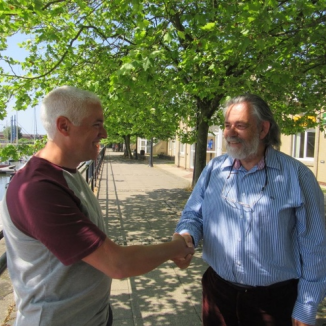Contact
Contact Rockhaven Counselling and Therapy
Please leave your name, your email address or phone number and a brief message.
I may be with clients when you initially try to make contact.
I will, however, endeavour to reply to you within 24 hours.

Appointments

08.00 - 21.00 (Tuesday - Thursday). Other days, including weekends, can be available- please enquire.
If meeting face-to-face, location and address will be made available before our first appointment.
Private parking is available at both Cranbrook and Dawlish.
Each counselling appointment is scheduled to last for 1 hour.
Longer appointments can be helpful and can be mutually arranged.
Standard fee:
£60 per hour.
Supervision
I also offer Supervision appointments, the length of each session and their frequency is dependent on either your caseload, your placement/ training institution’s requirements, or both.
I am experienced in providing supervision for both trainee and senior practitioners. Some of my supervisees have been with me since they first qualified 15 years ago.
Standard Fee:
£60.00 per hour

Frequently Asked Questions
Many therapists tend to view Counselling as ‘short-term’ work; when someone has a problem that can be looked at and discussed in a clearly resolvable way. This work often requires undertaking sessions for a certain number of weeks, to explore, discover and clarify a way forward. Therapy is a word used more to describe ‘long-term’ work; discussion that tends towards substantial issues and things that might be life-changing on a deeper level.
Whether counselling or therapy work best as a short- or long-term option depends on the client though, and the difficulties they are facing. In some cases counselling can prove helpful as a continuing, longer-term option, or therapy can help resolve an issue in just a few sessions.
There’s no fixed or ideal length of time for the counselling process; it varies from person to person and will often depend on the depth of the issues you are facing. I am happy to work on an open-ended basis with clients.
So, depending on what your needs are, some people find that after only a very few sessions they have some clarity and focus and are ready to move on. Other people value the ongoing support and relationship with me and will continue to come for months, or even years. There is no ‘one-size-fits-all’ when it comes to therapy.
I remember the time when Mr T came for an appointment.
“Remember me? I came to see you before I went abroad.”
“Sorry: You will have to remind me.”
“It was in 1974 in your old house, and you helped me with…
I’m back in the UK now and wondered if we could talk about ….”
My aim is to offer you a first appointment, as soon as is mutually convenient and the contract has been agreed. Hopefully this would be within 1 to 2 weeks after you’ve initially made contact with me.
Confidentiality is one of the main ways in which therapy differs from many other forms of helping – for example, talking to friends or family can rarely offer the same degree of confidentiality as talking to a counsellor. Because of this confidentiality, you will find that – as you get used to coming for therapy – you are freer to talk about whatever you wish to.
No therapist can offer 100% confidentiality: there are some situations where the law requires disclosure of risk (e.g. certain child protection issues) and in common with most other therapists, there are some situations where I may not be able to keep total confidentiality. In particular, if someone tells me that they are thinking of harming themselves in a way that I believe puts them at serious risk, or if someone tells me that they are doing something that could put others at risk, I may not be able to keep such information confidential. However, breaking confidentiality is rare, and only happens after talking to the person concerned.
This is something we can discuss. However, when you come for counselling it’s important that you feel free to talk about whatever is important to you. Sometimes, you may not be clear what those issues are. Having a friend or family member with you may not be helpful because they may have their own agenda for you. Even if this is just that they want to be supportive, or want you to ‘get better’, this agenda can prevent us opening issues up. When you come for therapy, you may need to explore thoughts or behaviours about which you feel ashamed or embarrassed and you may censor yourself so as not to hurt someone, or you may find that what they want you to talk about is not really what you need to discuss.
Sometimes, family/friends can even be part of an underlying issue which needs to be aired and discussed. Usually, people who ask this question are nervous about coming for a session alone, or they are anxious for the person who is thinking about arranging sessions. This anxiety is quite normal, and you will not be forced to talk about anything you feel uncomfortable about – but you do need to be able to talk about whatever is important. As I said at the beginning, please chat with me about any concerns you have.
Get in touch
To contact me, please either text or phone me on:
0788 2299 999
Or email me:
Please leave your name, your email address or phone number and a brief message.
I may be with clients when you initially try to make contact.
I will, however, endeavour to reply to you within 24 hours.

© Rockhaven Counselling and Therapy
powered by WebHealer
